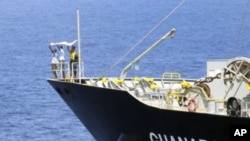The United Nation’s top legal advisor says the Somali Transitional Federal Government is not in favor of having specialized courts in other countries try Somali piracy suspects. Patricia O’Brien told the U.N. Security Council Somalia says it prefers such a court be established in Somalia and is willing to work with the United Nations toward an agreement on a location for it.
The United Nations has been exploring the idea of a specialized court to handle piracy suspects for some time. Various proposals include having the court established in Somalia or the region.
According to a U.N. report, there are just more than 1,000 suspected pirates in detention in 20 countries. Many of them have been convicted in courts in those countries, including Kenya, the Netherlands, the United States, Tanzania, Yemen and Oman.
But Somalia has the largest number of detained suspected pirates in custody and is conducting large numbers of prosecutions. O’Brien told the council that 290 cases have been concluded or are on-going in Puntland and 94 in Somaliland.
She said it would take about three years to bring piracy trials up to international standards and cost approximately $24 million for the courts and prisons. O’Brien said it might be done sooner if international experts assist and mentor local professionals.
“Achieving international standards will be a critical step because it will open the way for naval states to be able to enter into arrangements with the Somali authorities for the transfer of piracy suspects apprehended at sea to Somaliland and Puntland for prosecution,” O'Brien said.
O’Brien said a further step to opening the way for the transfer of piracy suspects to Somalia would be the building of new prisons in Somaliland and Puntland to provide a total of 1,000 prison spaces that comply with international standards. She said this would take about two years to accomplish.
O’Brien said the prospect of specialized piracy courts outside Somalia was discussed with the Transitional Federal Government and regional authorities, as well as with some neighbors.
“In the most recent consultations, officials of the Transitional Federal Government, and of Puntland and Galmadug expressed their preference for the location of any such court within Somalia, and confirmed their willingness to work toward agreement on a location for it,” O'brien said.
Among regional countries consulted as potential host states for an extra-territorial Somali court were Tanzania, which currently hosts the International Criminal Tribunal for Rwanda; the Seychelles, and Mauritius.
O’Brien said Tanzania expressed serious concerns about security if it shared the Rwandan court’s premises with the piracy court, concerns the United Nations shares.
Seychelles’ government said more discussions would be needed before it could reply to the Security Council, while Mauritius was receptive to the idea, but faced too many capacity constraints and other practical difficulties to make it possible.
Several council members said it would be wrong to disregard Somalia’s view about a court outside its territory. They noted the challenges and difficulties that would be faced in setting up such an extra-territorial court and supported assisting Somali courts and building domestic prison capacity.
Somalia Wants Piracy Courts on its Territory




